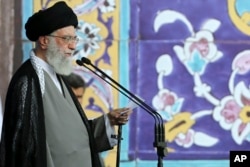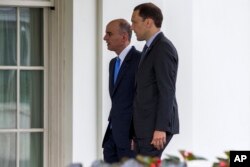U.S. Secretary of State John Kerry will try to "sell" the Iran nuclear deal to the American public Sunday with appearances on all five major television news talk shows.
The deal to prevent Iran from developing nuclear weapons comes after months of intense negotiations between Iran and six world powers. Now, the top U.S. diplomat is attempting to convince his countrymen that the agreement is, in fact, a good thing.
Some Republican Party politicians and presidential hopefuls have slammed the agreement and have promised to derail the deal in a possible congressional vote on the pact.
President Barack Obama has promised to veto any congressional attempt to thwart the initiative.
Obama says the deal does "more than anyone has done before" to prevent Iran from getting a nuclear weapon.
In his weekly address, Obama said Iran cannot cheat on the deal because the verification process it sets up is "comprehensive" and "intrusive."
The president said that if Iran reneged on the agreement, which calls for Iran to ship 98 percent of its nuclear material out of the country, the economic sanctions that have crippled the Iranian economy would snap back into place.
He said without the deal, the world risks having another war in the most volatile region in the world.
WATCH: President Barack Obama's weekly address
Earlier Saturday, Iran's supreme leader, Ayatollah Ali Khamenei, made his own comments on the deal, saying it did not signal cooperation with the U.S. and its allies on other issues.
Khamenei spoke to Iranians on live television as the nation celebrated the end of the holy month of Ramadan. He said the deal to end development of nuclear weapons in exchange for lifting economic sanctions was an exception to Iran's usual dealings with the United States.
Khamenei called the U.S. "arrogant" and said Iran would never bow to what he called "the enemy's excessive demands."
Saudi concerns
Saudi Arabia on Friday sent its foreign minister, Adel al-Jubeir, to the White House, where he received reassurances about the nuclear deal from Obama.
At a regular briefing after the private meeting, White House spokesman Josh Earnest told reporters that Obama and al-Jubeir talked about the Iranian nuclear agreement and how to boost security cooperation.
The spokesman did not give details of how the U.S. would increase military assistance, but he said the discussions built on talks Obama held with senior officials from Saudi Arabia and other Gulf Cooperation Council nations at Camp David in May. The president said at that time that the United States was prepared to work jointly with GCC states to deter and confront external threats to any member's territorial integrity.
Overtures criticized
Saudi leaders have criticized U.S. overtures to Iran, reflecting their concern that easing sanctions will enable Tehran to boost its financing of efforts to destabilize the region, including Yemen.
The Saudis also have expressed doubts that a deal would stop Iran from developing a nuclear bomb.
In a statement following Obama’s meeting with the Saudi foreign minister on Friday, White House officials said the two “welcomed” the agreement, which, “once fully implemented, will effectively cut off all of Iran’s pathways to a nuclear weapon and verifiably ensure that Iran’s nuclear program is exclusively peaceful going forward.”
U.S. officials are traveling to the Middle East in an attempt to alleviate regional misgivings about Iran's nuclear deal. Defense Secretary Ash Carter visits Israel and Saudi Arabia this week, while Kerry goes to the Gulf region in August. Israeli Prime Minister Benjamin Netanyahu has called the landmark deal "a historic mistake."
Next steps
The historic nuclear deal, reached between Iran and six world powers, is expected to be approved early Monday by the U.N. Security Council in Vienna, according to diplomats.
The resolution will begin the process of lifting international sanctions imposed on Iran, with Tehran giving up its nuclear program in exchange.
In the United States, Congress has 60 days to review and, should it choose, vote to approve or reject the pact.
Republican Senate Majority Leader Mitch McConnell predicted Obama would have a “real challenge” getting the pact through a skeptical, Republican-led Congress, and he criticized it as “the best deal acceptable to Iran, rather than one that might actually end Iran’s nuclear program."
Obama has promised to veto any congressional attempt to derail the initiative.







